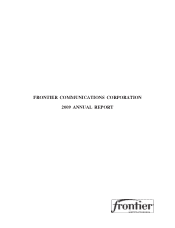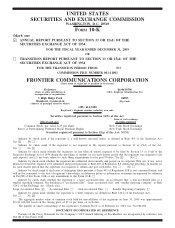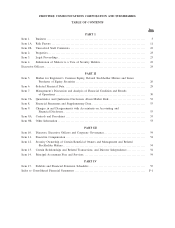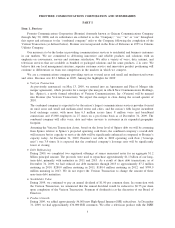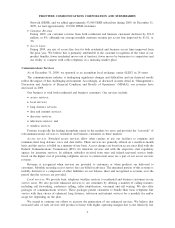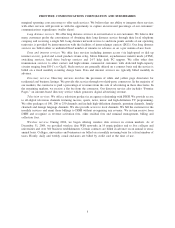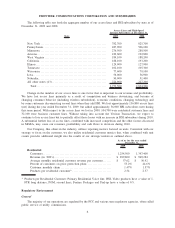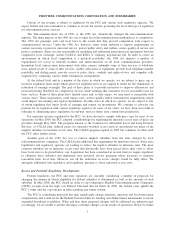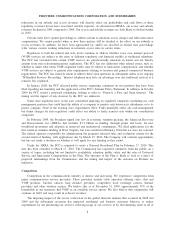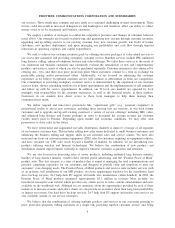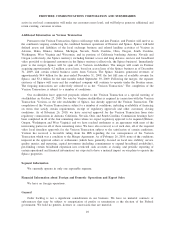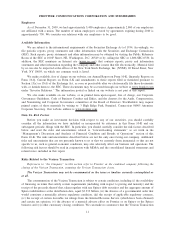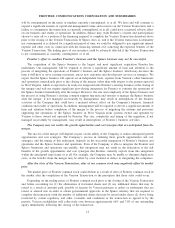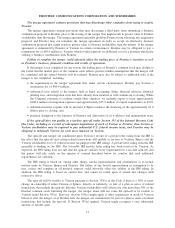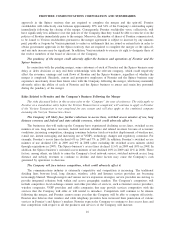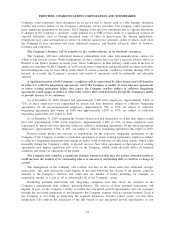Frontier Communications 2009 Annual Report Download - page 10
Download and view the complete annual report
Please find page 10 of the 2009 Frontier Communications annual report below. You can navigate through the pages in the report by either clicking on the pages listed below, or by using the keyword search tool below to find specific information within the annual report.reductions in our subsidy and access revenues will directly affect our profitability and cash flows as those
regulatory revenues do not have associated variable expenses. As discussed in MD&A, our access and subsidy
revenues declined in 2009 compared to 2008. Our access and subsidy revenues are both likely to decline further
in 2010.
Certain states have opened proceedings to address reform to intrastate access charges and other intercarrier
compensation. We cannot predict when or how these matters will be decided or the effect on our subsidy or
access revenues. In addition, we have been approached by, and/or are involved in formal state proceedings
with, various carriers seeking reductions in intrastate access rates in certain states.
Regulators at both the federal and state levels continue to address whether voice over internet protocol
(VOIP) services are subject to the same or different regulatory and financial models as traditional telephony.
The FCC has concluded that certain VOIP services are jurisdictionally interstate in nature and are thereby
exempt from state telecommunications regulations. The FCC has not addressed other related issues, such as:
whether or under what terms VOIP originated traffic may be subject to intercarrier compensation; and whether
VOIP services are subject to general state requirements relating to taxation and general commercial business
requirements. The FCC has stated its intent to address these open questions in subsequent orders in its ongoing
“IP-Enabled Services Proceeding.” Internet telephony may have an advantage over our traditional services if it
remains less regulated.
In January 2008, the FCC released public notices requesting comments on two petitions that have been
filed regarding net neutrality and the application of the FCC’s Internet Policy Statement. In addition, in October
2009 the FCC issued a proposed rulemaking looking at rules to “Preserve a Free and Open Internet.” The
timing and the impact of any decision by the FCC are unknown.
Some state regulators have in the past considered imposing on regulated companies (including us) cash
management practices that could limit the ability of a company to transfer cash between its subsidiaries or to its
parent company. None of the existing state requirements (New York) materially affect our cash management
but future changes by state regulators could affect our ability to freely transfer cash within our consolidated
companies.
In February 2009, the President signed into law an economic stimulus package, the American Recovery
and Reinvestment Act (ARRA), that includes $7.2 billion in funding, through grants and loans, for new
broadband investment and adoption in unserved and underserved communities. We filed applications for the
first round of stimulus funding in West Virginia, but were notified in February 2010 that we were not selected.
The federal agencies responsible for administering the programs released rules and evaluation criteria for the
second round of funding, with applications due by March 15, 2010. The Company will evaluate opportunities
but has not made a decision on whether it will apply for any funding in this round.
Under the ARRA, the FCC is required to create a National Broadband Plan by February 17, 2010. This
date has been extended to March 17, 2010. The Commission has requested comments from the public on a
variety of topics, including but not limited to availability, adoption, public safety and the roles of Universal
Service and Intercarrier Compensation in the Plan. The outcome of the Plan is likely to lead to a series of
proposed rulemakings from the Commission, and the timing and impact of the outcome on Frontier are
unknown.
Competition
Competition in the communications industry is intense and increasing. We experience competition from
many communications service providers. These providers include cable operators offering video, data and
VOIP products, wireless carriers, long distance providers, competitive local exchange carriers, Internet
providers and other wireline carriers. We believe that as of December 31, 2009, approximately 73% of the
households in our territories had VOIP as an available service option. We also believe that competition will
continue in 2010 and may result in reduced revenues.
The lingering impact of the severe contraction in the global financial markets that occurred in 2008 and
2009 and the subsequent recession has impacted residential and business customer behavior to reduce
expenditures by not purchasing our services, reducing usage of our services or by discontinuing some or all of
8
FRONTIER COMMUNICATIONS CORPORATION AND SUBSIDIARIES

